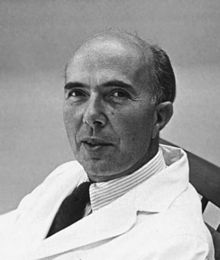Renato Dulbecco
Renato Dulbecco (born February 22, 1914 in Catanzaro , Italy , † February 19, 2012 in La Jolla , California , USA) was an Italian- American physician , bacteriologist, microbiologist and molecular biologist as well as a Nobel Prize winner.
Life
Dulbecco grew up in Liguria in the coastal town of Imperia (Liguria) , graduated from high school at the age of 16 and studied medicine at the University of Turin , where he mainly dealt with biology under anatomist Giuseppe Levi with histology. There he met Salvador Luria and Rita Levi-Montalcini , who studied with him and with whom he became friends. In 1936 he graduated in pathology. From 1936 to 1938 he did his military service as a doctor, served on the front lines in France and Russia during World War II and was wounded. After his release, he joined the Italian resistance against the German occupation. After the war he was back in Levi's laboratory.
In 1947 Dulbecco moved to the USA, initially to Bloomington (Indiana) , where he researched bacteriophages with Salvador Luria . In 1949 he moved to Caltech , where he joined Max Delbrück 's bacteriophage research group. Here he began his work on animal tumor viruses. From 1962 Dulbecco conducted research at the Salk Institute for Biological Studies in La Jolla , California and from 1972 at the Imperial Cancer Research Institute in London. In the mid-1980s he was one of the initiators of the Human Genome Project . From 1993 to 1997 he was director of the Institute of Biomedical Technologies of the Italian National Research Council CNR in Milan. At the same time he was still a member of the Salk Institute.
In the late 1950s, Howard Temin was his student, as was David Baltimore . Dulbecco and his group showed that oncoviruses incorporate their genetic material into the host's genome. Temin and Baltimore later showed independently of one another that this happens with the reverse transcriptase they discovered, which has become a key tool in genetic engineering and occurs in the AIDS virus. In humans, only some types of cancer are caused by oncoviruses, but the mechanism shown in their example also played an important role in clarifying the cause of other cancers (tumor genes and anti-genes).
In the 2000s, he studied cancer stem cells and demonstrated that a single such cell can cause cancer in mice.
Honors and memberships
In 1961 Dulbecco was elected to the National Academy of Sciences , 1965 to the American Academy of Arts and Sciences and he was a Fellow of the Royal Society (1974). In 1993 he became an elected member of the American Philosophical Society . In 1964 he received the Albert Lasker Award for Basic Medical Research , in 1965 the Howard Taylor Ricketts Award and the Marjory Stephenson Prize, in 1967 the Paul Ehrlich and Ludwig Darmstaedter Prize , in 1973 the Louisa Gross Horwitz Prize , in 1974 the Selman A. Waksman Award in Microbiology and the Leeuwenhoek Medal from the Royal Society. In 1975, together with David Baltimore and Howard M. Temin, he received the Nobel Prize in Physiology or Medicine “for their discoveries in the field of the interactions between tumor viruses and the genetic material of the cell”.
See also
Dulbecco's Modified Eagle Medium .
Works
- The blueprint of life. The key questions in biology. Piper, Munich et al. 1991, ISBN 3-492-03333-4 .
- (with Riccardo Chiaberge): Constructors of Life. Medicine and ethics in the age of genetic engineering. Piper, Munich et al. 1991, ISBN 3-492-11415-6 ( Piper 1415).
- Encyclopedia of Human Biology. Sand Diego 1997.
literature
- David Baltimore : Renato Dulbecco (1914-2012). In: Science . Volume 335, No. 6076, 2012, p. 1587, doi: 10.1126 / science.1221692
- Inder M. Verma: Renato Dulbecco (1914-2012). In: Nature , Volume 483, 2012, p. 408, doi: 10.1038 / 483408a
Web links
- Information from the Nobel Foundation on the 1975 award to Renato Dulbecco (English)
Individual evidence
- ↑ Renato Dulbecco, 97, Dies; Won Prize for Cancer Study , The New York Times, February 20, 2012. Retrieved February 22, 2012.
- ^ Gisela Baumgart: Dulbecco, Renato. In: Werner E. Gerabek , Bernhard D. Haage, Gundolf Keil , Wolfgang Wegner (eds.): Enzyklopädie Medizingeschichte. De Gruyter, Berlin / New York 2005, ISBN 3-11-015714-4 , p. 326 f.
| personal data | |
|---|---|
| SURNAME | Dulbecco, Renato |
| BRIEF DESCRIPTION | Italian-American biologist |
| DATE OF BIRTH | February 22, 1914 |
| PLACE OF BIRTH | Catanzaro |
| DATE OF DEATH | February 20, 2012 |
| Place of death | La Jolla , California |
